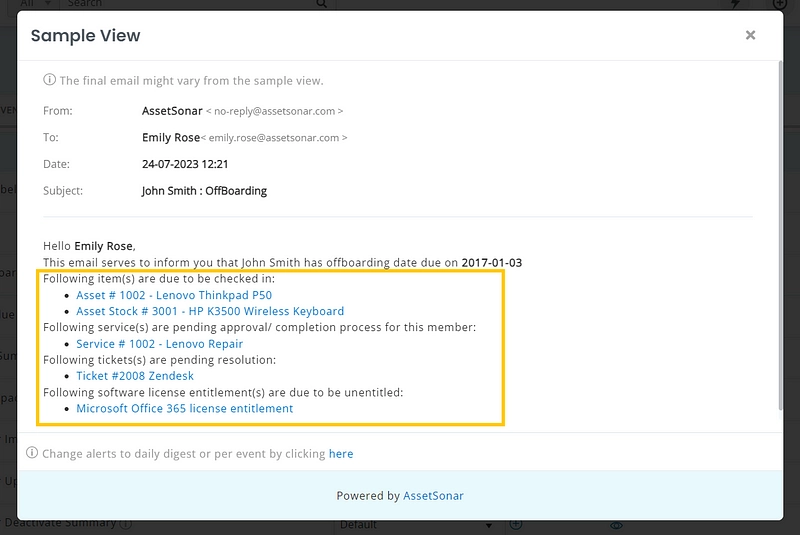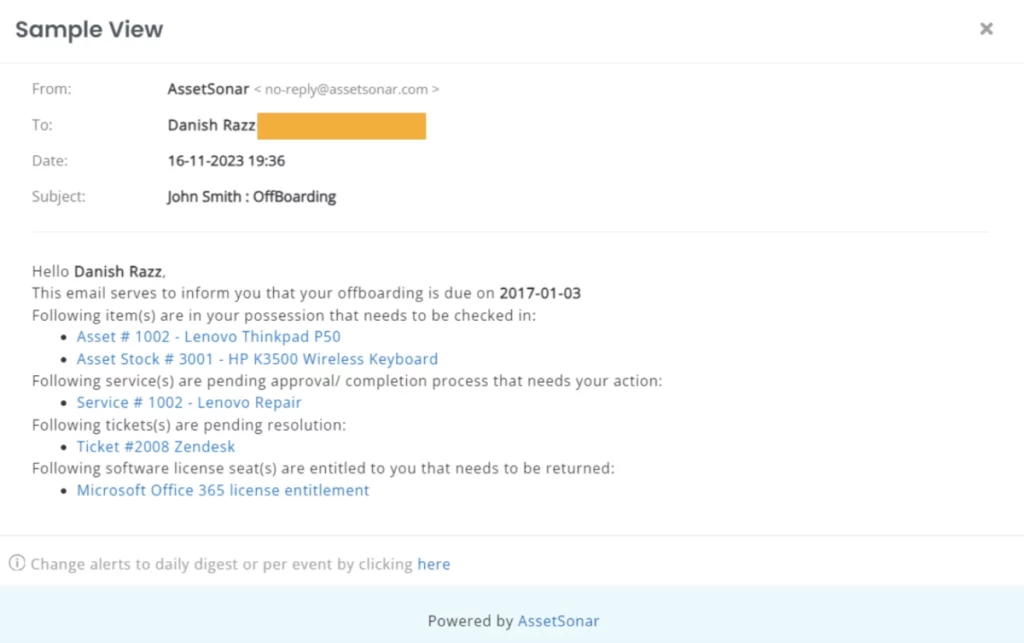Always stay informed about employee offboarding by proactively setting up notifications about employee exit dates with AssetSonar. Offboarding workflows in AssetSonar empowers Admins to get alerts about assigned IT assets and software license entitlements as well as pending tickets, issues, or services associated with the exiting employee(s).
Ensure that all assigned IT assets and licenses are checked back in and associated tickets are resolved before your employee(s) leave the organization.
Benefits of Employee Offboarding Workflows
- Cost savings: Avoid costs that result from misplacement of expensive IT assets, delayed cancellation of software licenses, and consequences of intellectual property loss and security breaches. According to the Ponemon Institute, every lost laptop costs an organization approximately $49,000 in terms of the data value a device contains.
- Security and audit compliance: Timely check-in of IT devices and software licenses ensures that exiting employees have no access to sensitive company data and valuable intellectual property. Swift offboarding ensures complete security compliance. It also reduces audit risk by keeping your available asset repository up-to-date.
- Increased efficiency: Offboarding with AssetSonar translates into convenience for IT Admins. By consolidating all the relevant data of the leaving employees in a single platform, it ensures efficiency and saves manhours needed to offboard employees.
- Smooth employee exits: Proactive offboarding approach with timely alerts and reminders helps streamline the last few interactions of the leaving employees with your organization, enabling maximum employee satisfaction.
Let’s walk you through some basic steps of offboarding in AssetSonar.
1. Member Offboarding in AssetSonar
There are three ways you can offboard employees using Member Offboarding in AssetSonar.
1.1. Via Active Directory
From the Attributes section of your SCIM, LDAP, and GSuite Active Directories, add an attribute under the Basic Attribute heading named ‘Offboarding Date’ so that data can be mapped.

It will appear in AssetSonar as follows:

1.2. Via Excel imports
You can also add offboarding dates for respective Members while adding or updating them via Excel sheet imports. Go to the Members&Access → Import Members → Add New Members/Update Existing Members.

From here, you can upload the Excel file containing Member information and add the column for offboarding date.

Once the Excel file is uploaded, you can view the offboarding details on the Member Listings page.

1.3. Via Member profiles
In order to add offboarding dates for individual Members, go to the Member Details page and click on ‘Edit’.

Here, you can enter the offboarding date and hit ‘Update’. The Offboarding Date will appear on the Member profile as follows:

After adding Offboarding dates for Members, add the column on the Listings page as follows:

After you save the view, the Listings page will appear as follows:

2. Offboarding alerts for Admins
When you have set an offboarding date for a Member, all the information gets collected and is sent as:
- Email alerts
- Service Desk alerts
Once you have updated the off-boarding dates, your off-boarding date is likely to be
- In the future (a month from the present date)
- In the future or has passed
In both scenarios, the offboarding workflow will be different. Let’s look at both workflows step by step:
- Future off-boarding date: If the member is to be offboarded in a few weeks’ time, then the member status remains the same i.e., not changed to deactivated. All Admins are sent email alerts depending on your enabled alerts.
To enable alerts from the main navigation menu, go to More→ Alerts&Email → Members and turn on the required alerts as shown.

The sample email alert for Member Offboarding includes Assets and Asset Stock checked out to the Member. It also shows any pending Zendesk tickets, Work Orders, Purchase Orders, and Maintenance and Service tickets for the Member.

To set up recurring alerts, click the bell icon next to ‘Off-boarding due in — days’ Reminder.

After this, you will be redirected to the following window where you can set the frequency of alerts once you click ‘Add another’.

You will receive an alert before the number of days you have selected. For example, if you have selected three days and the member’s offboarding is due on 10 August 2023, then you will get an alert on 7 August 2023 reminding you of the offboarding.
2. Offboard anytime: Admins can offboard the members directly at any time regardless of when the offboarding date is. To do this, Go to Members&Access → Member Profiles → More → ‘Offboard Member’

Once you click ‘Offboard Member’, you will be taken to the following window where you can enter the Member’s offboarding date and change the status to ‘Inactive’.

Click Update and you will receive a message highlighting the pending items on the member. The status of the member will be updated to ‘Inactive’ as well.

You can also enable the automatic deletion of offboarded members by going to Settings→Company Settings&Addons → Member Offboarding → Enabled. This allows deactivating members automatically once their offboarding date passes.

2.1. Offboarding alerts for members
Members will receive notifications and reminders of when their offboarding is due. Timely email alerts help check-in IT assets, resolve pending tickets, and any other approvals without delays. Enabling this alert will send reminder alerts to Staff users and Agents about when their offboarding is due.
To set Offboarding Reminder alerts, please go to More → Alerts & Emails → Staff Alerts tab and turn on the required alerts as shown.

To set up recurring alerts, please click the bell icon next to ‘Offboarding due in — days Reminder’.
Click ‘Add another’ to set the frequency of alerts as required. You will receive an alert before the number of days you have selected. For example, if you selected three days and the member’s offboarding is due on 10 May 2024, you will get an alert on 7 May 2024 reminding you of the offboarding.

The sample email alert for Member Offboarding Reminder includes Assets and Asset Stock to be checked in by the Member. It also shows any pending Zendesk tickets, Work Orders, Purchase Orders, and Maintenance and Service tickets for the Member.

3. Offboarding reports and KPIs
You can run Custom Reports for offboarding members as well. Simply select the Offboarding Date as a field in Step 2.

A Members Custom Report containing Offboarding dates will look like this:

You can keep track of pending associations with offboarded members. Go to Reports → Member Reports.


You can set three KPIs for offboarding dates of Members on the dashboard as shown below:
- Pending Offboardings: This contains the total count of employees whose offboarding process is incomplete.
- Offboarding due today: This includes the total count of employees with the current date as their offboarding date. When clicked, the system filters out and displays all such employees.
- Offboarding due in the next 7 days: This KPI consists of the total count of employees who have their offboarding date 7 days after the current date. When clicked, the system filters out and displays all employees who have their offboarding due in a week.

Read more: Simplify ITAM Workflows: Set Rules That Auto-Assign Devices To Groups
Frequently asked questions
Q1. Who can update the offboarding date?
Offboarding date can only be updated if the member is an Admin.
Q2. Offboarding alerts for admins and members are switched on by default?
Alerts are switched on for Admins by default. Staff Alerts and ServiceDesk Alerts will not be switched on by default.
Q3. What are the default days for recurring alerts?
By default, recurring alerts are sent 7 days prior to the offboarding date.







